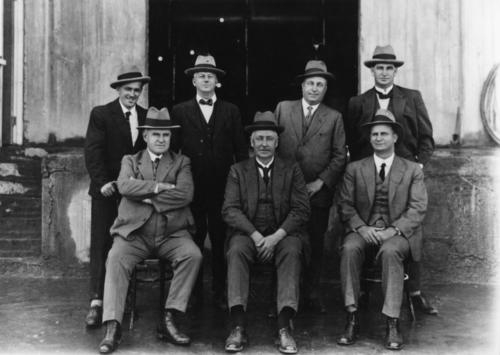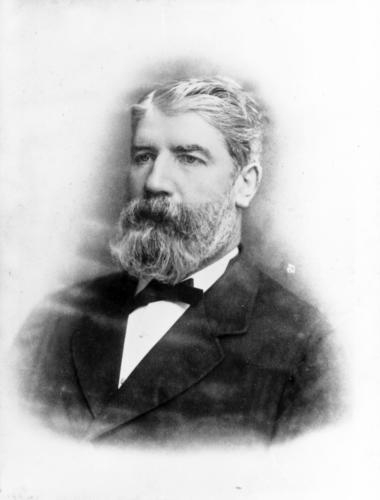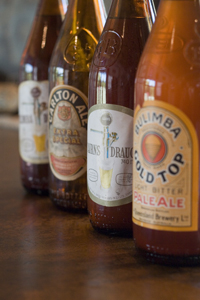
CUB in Queensland
It is a curious feature of the Queensland brewing industry that a great many more of its early brewers and beer entrepreneurs came from distant Victoria than from neighbouring New South Wales.
As far as this industry is concerned, therefore, Queensland can be said to have been colonised by Victorians. Indeed, both of the major players in the present industry have Victorian roots.
Patrick Perkins, who with his brother Thomas established breweries at Toowoomba (1869) and Brisbane (1872), had prior brewing experience in Victoria. So too did the Fitzgerald brothers, Edward and Nicholas, who opened a branch of their Castlemaine Brewery in Brisbane in 1878. The successful Perkins and Castlemaine breweries merged in 1928 to become by far the biggest beer producer in Queensland.
Back in Victoria, several brewing companies had combined in 1907 to form Carlton and United Breweries, that state’s dominant producer by far. By the time of the creation of Castlemaine-Perkins in Brisbane, CUB had established a strong foothold in Queensland by shipping its Melbourne-brewed products to northern ports such as Cairns and Townsville, in competition both with the small local producers and with the Brisbane brewers. In doing so, CUB assisted the big Brisbane firms to eliminate the small breweries in the far northern part of Queensland.

John L. Dreheny of Toowoomba; W. J. White of Townsville; P. J. Cahill of Sydney; A. L. Nevitt of Cairns; and E. S. Williams of Yungaburra. Possibly the first directors of the Cairns Brewery. (John Oxley Library)
Amidst the flood of imported southern beers, a group of investors in 1924 formed the Cairns Brewery Company to build a new brewery in Cairns, the first to operate there for more than twenty years. Its first beer was placed on the market in July 1925. The manager and brewer was John Louis Breheny, who until recently had run his own brewery at Toowoomba, but who had worked at the Abbotsford Brewery in Melbourne before moving to Queensland in 1908.
The Cairns Brewing Company soon ran out of money, and in 1927, a new company—Northern Australian Breweries—was formed to take over and continue its affairs.
Captain Auguste J. C. de Bavay came from Melbourne to manage the brewery, which was enlarged and improved, and named the Great Northern (although it continued to be known popularly by the simpler title of the Cairns Brewery). Beer began to flow again at the end of December 1927.
Local consumers were initially resistant to drinking Cairns beer, having become used to the southern products over many years, but the new company soon overcame their prejudice and won their loyal support.
Carlton and United Breweries remained, however, a formidable foe. The Victorian monopolist, seeing that it was not about to eradicate the threat to its North Queensland trade by fair competition, resorted to more desperate measures. Early in 1931 it began a price war, slashing draught beer prices by half at Innisfail.
The Cairns brewery, through its pugnacious new manager Reg Fogarty, and supported by the Cairns press, implored drinkers to resist the southern attack. Prices would remain low, Fogarty said, ‘only until their object of destroying the Cairns brewery is attained’.
Then suddenly, in mid-March 1931, the battle scene became quiet.
CUB had succeeded in gaining a majority shareholding of Northern Australian Breweries, and therefore control of the Cairns brewery. Exactly how this was achieved is unknown, but in retrospect it seems to have been a satisfactory compromise. The Cairns public kept their brewery, and CUB kept its North Queensland trade. History tells us that the only other possible outcome was for the small, independent Cairns brewery to have been quickly crushed out of existence.
Carlton and United Breweries remained content with its position in Queensland—control of the northern part—until the 1960s, when it began to yearn for a larger slice of the pie.
In January 1961, the firm made a takeover offer for Queensland Brewery Limited, the smaller of the two surviving Brisbane-based beer firms. The other, Castlemaine Perkins Limited, later announced a rival bid, but the Victorian brewer soon succeeded in gaining control.
In the meantime, in February 1961 CUB purchased all the shares of Thomas McLaughlin and Co., operator of a brewery at Rockhampton. Thus, by April 1961, the Queensland brewing industry had been reduced to an absolute duopoly (which, by the way, it had almost been since the 1930s). In 1961 CUB in owned four of the five remaining breweries in Queensland: one in each of Brisbane, Toowoomba, Rockhampton and Cairns. Its only Queensland competitor, Castlemaine Perkins Limited, had only the Milton Brewery in Brisbane, having closed its Toowoomba branch, the old Downs Brewery, in 1959.
Carlton and United Breweries Limited consolidated its position in Central Queensland by opening a new brewery at North Rockhampton in 1970, but it closed this early in 1976, when it was still fairly new, preferring to supply the Central Queensland market from its much bigger Brisbane brewery. Its old and inefficient Toowoomba brewery was closed at the same time.
This left only three breweries in operation in Queensland in the late 1970s: two in Brisbane and one at Cairns. The Cairns brewery survived until 1992, its closure that year completing the centralisation of the Queensland brewing industry to Brisbane.
The duopoly structure of the Queensland brewing industry, instituted in 1961, essentially remains in 2010 despite the appearance of several, mostly tiny, newcomers since the late 1980s.
Carlton and United Breweries has been subsumed within the global drinks company Foster’s Group Limited, named, oddly, after one of the least significant participants in the 1907 Melbourne amalgamation. The company’s Queensland brewery has decentralised from Fortitude Valley in Brisbane to Yatala on its southern outskirts, the site of a new competitor which it successfully exterminated.
The former Castlemaine-Perkins brewery in Brisbane, although now part of the Japanese food and beverage firm Kirin Holdings, remains the other major player in this continuing two-sided struggle.
Against this historical background, what does one make, then, of the recent creation of Great Northern Brewing Company as a marketing tool of Queensland Breweries Pty Ltd, Foster’s Group’s Queensland beer subsidiary?
The Great Northern Brewery at Cairns, founded in 1927, was supported by the North Queensland public because it created nearly forty jobs and kept a large amount of money in Cairns which otherwise would have been spent on imported beer. It survived despite the efforts of CUB to orchestrate its downfall.
To now create a brand name which purports to be a tribute to the former Cairns brewery, then to brew it in Brisbane, I think misses the point. What Cairns drinkers yearn for is a real brewery to replace that which was closed eighteen years ago, not a new brand and more southern imports. The founders of Blue Sky Brewery, which opened in Cairns in 2008, understood this, and despite its small size, this little brewery has already gone a long way towards satisfying the nostalgic desires of Cairns drinkers.
[adrotate banner=”45″]





